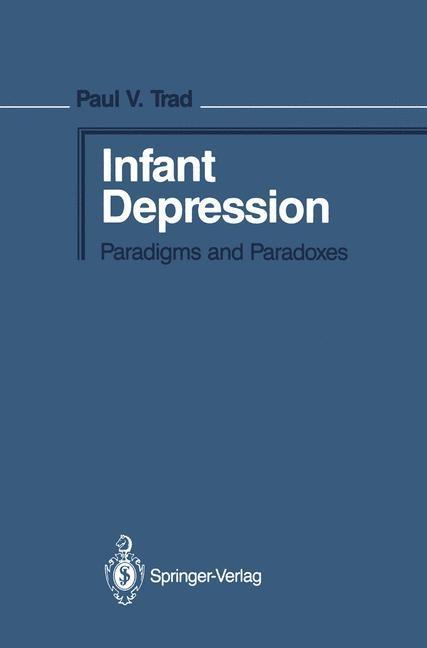For me, the word "infant" has always had a strange and compelling fascination. This book, in essence, represents the first step of what I hope will be a long and fruitful journey into the mysteries of the infant psyche, with special emphasis on the phenomenon of early-life depressive symptomatology. From the outset of my medical training, I was particularly attracted to the field of psychiatry. As a resident exposed to adult patients in a psychiatric ward, I can vividly recall, even these many years later, the deep sense of poignancy and distress while in the presence of minds gone awry. It is my belief that psy chiatry, more than any other branch of medicine, presents the physician with the ultimate paradox-the elusive diagnosis. By this I mean that while the symp tomatology of psychiatry may be classified and analyzed, while diagnoses, prog noses, and treatment schedules can be devised, within psychiatry the unique configuration of each individual patient emerges with a clarity and distinction unparalleled in any other medical field. Before any psychiatric diagnosis can be formulated, the therapist must first delve deeply into the ultimate singularity of the patient. As a consequence, psychiatry is, in the final analysis, concerned with the dignity of each patient, and the psychiatrist is continually challenged to explore the most formidable and elaborate aspect of each person-the human mind. That said, I need to express the reasons for my dedication to child psychiatry.
Inhaltsverzeichnis
1 Developmental Psychopathology. - The Perspective of Developmental Psychopathology. - A Developmental Perspective on Depression. - Predictive Validity. - Future Directions: Need for Improved Research and Classification Methods. - Organization of Book. - 2 Correlates of Temperament to Depressive Phenomena. - Case Report. - Individual Differences and Importance of Stability Over Time. - Relationship Between Depressive Disorders and Temperament. - Methodological Issues in the Study of Temperament. - Conclusion. - 3 Correlates of Attachment to Depressive Phenomena. - Case Report. - Description of Attachment Behavior. - Definition and Measurement of Attachment Behavior. - Stability and Correlations of Behavioral Patterns. - Factors Affecting the Development and Display of Attachment Behaviors. - The Function of Avoidant Behavior. - Precursors of Avoidance Behaviors. - Other Studies Involving Infants at Risk for Affective Disorders. - Relevance of Avoidant Behavior. - Conclusions. - 4 Correlates of Object Permanence and Constancy to Depressive Phenomena. - Case Report. - Object Permanence. - Development and Significance of Object Permanence. - Significance of Object Constancy. - Factors Affecting Object Constancy. - Development of Object Constancy. - Conclusion. - 5 Correlates of the Self to Depressive Phenomena. - Case Report. - Defining Self-Concept. - The Development of Self-Concept During Infancy. - Self-Concept Among Preschoolers and Older Children. - Development of Self-Concept During School Years. - Development of Self-Regulation. - Relation of Self to Attachment. - Relationship of Self-Schemas to Depressive Pathology. - Conclusions. - 6 Correlates of Empathy to Depressive Phenomena. - Case Report. - Definitions of Empathy. - Development of Empathic Distress. - Empathic Transformation into Guilt and Its Relationship to Prosocial Action. - Conclusion. - 7 The Face-to-Face Interaction Paradigm. - Case Report. - Defining the Paradigm. - Model for Studying Depressive Dyadic Interaction. - Developmental Lines That Delineate Infant Depression. - Infant s Perspective. - Affective Response. - Cardiac Response. - Caregiver s Perspective. - Mutual Dyadic Interactive Mechanism: General Dyadic Behavior. - Discrepancy Awareness Hypothesis. - Gazing Patterns Within Dyadic Model. - Comparison Between Healthy and At-Risk Infants. - Infant Attachment and Response to Strangers. - Depressive Dyadic Interaction. - Conclusion. - 8 Learned Helplessness Paradigm. - Case Report. - Overview of the Learned Helplessness Paradigm. - Temperament Capabilities as Factors Influencing Learned Helplessness. - The Discrepancy Awareness Hypothesis. - The Effectance Motivation System. - Contingency Awareness. - Attachment Behaviors as Factors Influencing Learned Helplessness. - Development of Self. - Contingency and Self-Concept: Attributional Style. - Conclusion. - 9 Correlates of Neuroendocrinology to Depressive Phenomena. - Case Report. - Interactions Between Internal States and External Events. - Assessment of Current Status of Biogenic Amine Theories. - Developmental Psychoendocrinology: Therapeutic Implications for Definition and Treatment of Depression. - Conclusion. - 10 Clinical Paradigm. - Models of Childhood Depression. - Case Report. - Maternal Deprivation. - Clinical Studies of Maternal Separation. - Conclusion. - References.




































